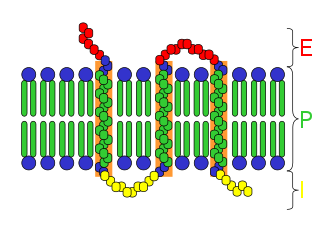Receptor (biochemistry)
== Receptor (biochemistry) ==
A receptor in biochemistry is a protein molecule that receives and responds to a neurotransmitter, hormone, or other substance. Receptors are typically found on the surface of a cell membrane, but they can also be located within the cell. When a substance binds to a receptor, it causes a change in the receptor's structure, which can trigger a series of cellular responses.
Types of Receptors
Receptors can be classified into several types based on their location and the type of ligand they bind to:
- Cell surface receptors: These receptors are embedded in the plasma membrane of cells. They include:
* G protein-coupled receptors (GPCRs) * Ion channel receptors * Enzyme-linked receptors
- Intracellular receptors: These receptors are located inside the cell, typically in the cytoplasm or nucleus. They include:
* Nuclear receptors
Mechanism of Action
When a ligand binds to a receptor, it induces a conformational change in the receptor. This change can activate or inhibit the receptor's associated signal transduction pathways. For example:
- In GPCRs, the binding of a ligand activates a G protein, which then activates or inhibits other proteins in the cell.
- In ion channel receptors, the binding of a ligand opens or closes the channel, allowing ions to flow into or out of the cell.
- In enzyme-linked receptors, the binding of a ligand activates an associated enzyme, which then triggers a cascade of cellular events.
Functions
Receptors play a crucial role in various physiological processes, including:
Examples of Receptors
Some well-known examples of receptors include:
- Adrenergic receptors, which respond to adrenaline and noradrenaline
- Dopamine receptors, which respond to dopamine
- Insulin receptors, which respond to insulin
- Estrogen receptors, which respond to estrogen
Clinical Significance
Receptors are important targets for many pharmaceutical drugs. For example:
- Beta-blockers target adrenergic receptors to treat hypertension and cardiovascular disease.
- Antipsychotics target dopamine receptors to treat schizophrenia and other mental disorders.
- Insulin therapy targets insulin receptors to manage diabetes mellitus.
See Also
References
External Links
Transform your life with W8MD's budget GLP-1 injections from $125.
W8MD offers a medical weight loss program to lose weight in Philadelphia. Our physician-supervised medical weight loss provides:
- Most insurances accepted or discounted self-pay rates. We will obtain insurance prior authorizations if needed.
- Generic GLP1 weight loss injections from $125 for the starting dose.
- Also offer prescription weight loss medications including Phentermine, Qsymia, Diethylpropion, Contrave etc.
NYC weight loss doctor appointments
Start your NYC weight loss journey today at our NYC medical weight loss and Philadelphia medical weight loss clinics.
- Call 718-946-5500 to lose weight in NYC or for medical weight loss in Philadelphia 215-676-2334.
- Tags:NYC medical weight loss, Philadelphia lose weight Zepbound NYC, Budget GLP1 weight loss injections, Wegovy Philadelphia, Wegovy NYC, Philadelphia medical weight loss, Brookly weight loss and Wegovy NYC
|
WikiMD's Wellness Encyclopedia |
| Let Food Be Thy Medicine Medicine Thy Food - Hippocrates |
Medical Disclaimer: WikiMD is not a substitute for professional medical advice. The information on WikiMD is provided as an information resource only, may be incorrect, outdated or misleading, and is not to be used or relied on for any diagnostic or treatment purposes. Please consult your health care provider before making any healthcare decisions or for guidance about a specific medical condition. WikiMD expressly disclaims responsibility, and shall have no liability, for any damages, loss, injury, or liability whatsoever suffered as a result of your reliance on the information contained in this site. By visiting this site you agree to the foregoing terms and conditions, which may from time to time be changed or supplemented by WikiMD. If you do not agree to the foregoing terms and conditions, you should not enter or use this site. See full disclaimer.
Credits:Most images are courtesy of Wikimedia commons, and templates, categories Wikipedia, licensed under CC BY SA or similar.
Contributors: Prab R. Tumpati, MD



